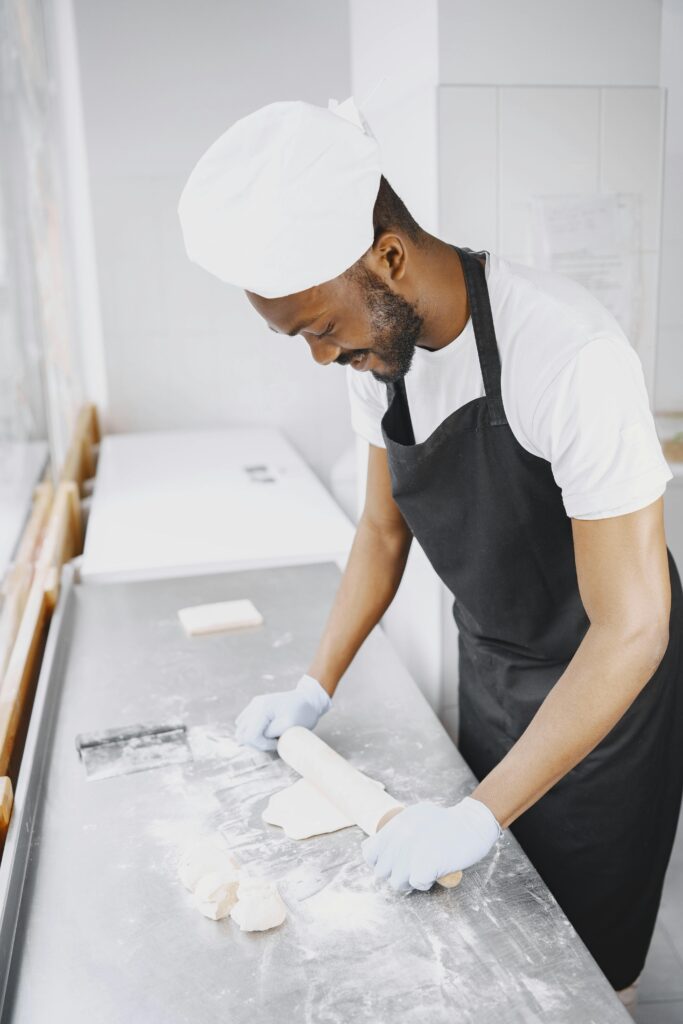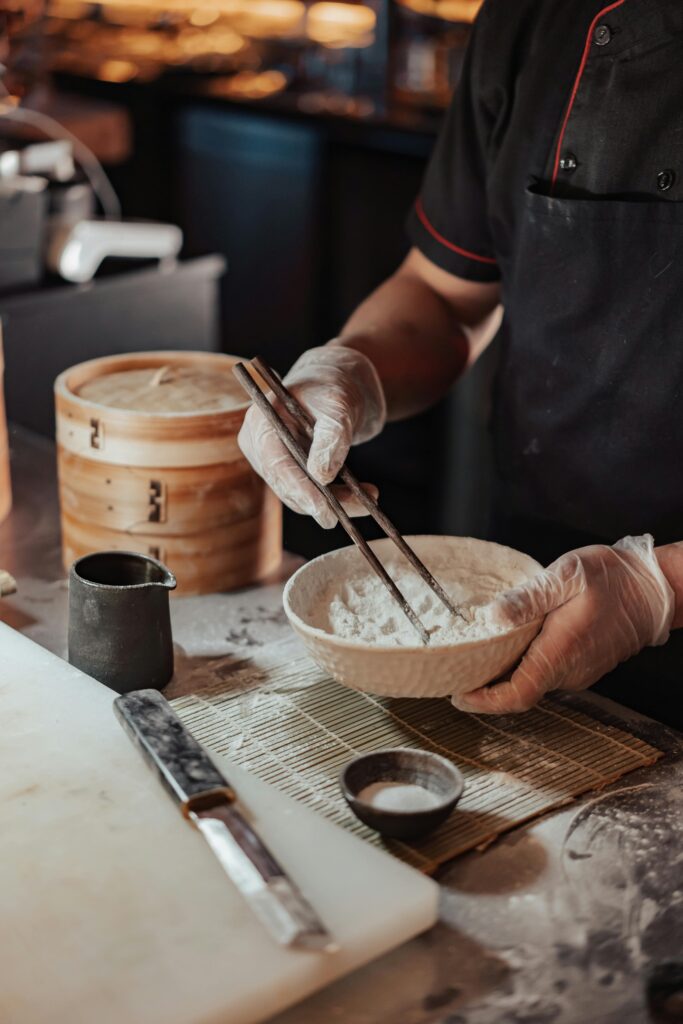Culinary skills are more than just knowing how to cook and if you think being able to cook is all it takes to become a great chef? Think again. The truth is, it’s the culinary skills you don’t learn from recipes or cookbooks that will truly set you apart in the kitchen.
Becoming a successful chef isn’t just about knowing how to follow recipes. It’s about mastering classic cooking techniques, growing as a person, and thinking creatively to make every dish your own. It’s this mix of skills—both in the kitchen and outside of it—that sets great chefs apart from the rest.
In this blogpost, we’ll focus on 5 essential culinary skills that don’t always get the spotlight—things that can really set you apart as a chef. These aren’t just about culinary techniques; they’re about how you handle stress, find your own style, work with others, and get creative in the kitchen. These are the skills that can help you stand out and succeed in the food industry. Let’s do this!

1. The Power of Mise en Place as an essential culinary skill and How It Makes You More Efficient in the Kitchen
One of the most important culinary skills that separates great chefs from the rest has little to do with the actual cooking itself—it’s all about organization. If you’ve ever worked in a busy kitchen, you know the pressure that comes with juggling multiple tasks at once. The difference between a chaotic kitchen and a smooth service often comes down to one thing: mise en place.
Mise en place is a French term that simply means “everything in its place,” but its importance goes far beyond just having ingredients lined up neatly. It’s about preparing your kitchen and your mind for the task at hand. It’s about creating a system that allows you to work efficiently, stay organized, and keep your cool—no matter how intense the heat of the kitchen gets.
But here’s the thing: mise en place isn’t just about chopping vegetables and measuring spices before you start cooking. It’s a mindset. It’s about having a plan, being proactive, and knowing exactly where everything is—so you don’t waste time or energy looking for a tool or ingredient in the middle of a rush.
Mastering mise en place is how you build efficiency into your kitchen routine. Whether you’re working in a five-star restaurant or cooking a meal at home, the system you create before you even begin cooking has a huge impact on how smoothly the rest of the process will go.

2. Developing Mental Resilience: One Culinary Skill that You Must Learn
Another great culinary skill that can help you become better at being a chef is mental resilience—it’s about how you handle pressure. In the heat of the kitchen, mental resilience is key. It’s what helps you stay calm under stress, keep your focus when things get chaotic, and bounce back after a setback.
Mental resilience is not something you’re born with—it’s a culinary skill you can build. It’s about developing the ability to stay composed, think clearly, and manage stress during busy services. When you have mental resilience, you can stay sharp, make decisions quickly, and perform your best, no matter how tough the situation gets.
Building resilience also means developing emotional intelligence. Being able to recognize and manage your emotions, as well as those of your team, helps maintain a positive, focused atmosphere—even in the most stressful moments.
In the kitchen, mental resilience isn’t just about toughing it out. It’s about staying focused, adaptable, and learning to keep your cool when the heat is on.
3. The Art of Building Supplier Relationships: Sourcing Ingredients Like a Pro
Great chefs know that solid relationships with suppliers can lead to better pricing, consistent quality, and sometimes even exclusive products. A great chef isn’t just skilled with a knife—they’re also skilled at building strong relationships with suppliers.
Sourcing quality ingredients is a key part of what makes a dish stand out, and knowing where to get the best products can make all the difference. But it’s not just about finding good suppliers—it’s about building trust and maintaining partnerships over time.
It’s about working together to ensure you always have what you need, when you need it, without compromising on quality.
Whether you’re working with local farmers, specialty stores, or international distributors, your ability to source ingredients like a pro will directly impact the dishes you create—and your success in the kitchen.
4. The Science of Texture: Why It Matters Just as Much as Taste
When we think of great dishes, we often focus on taste—but texture is just as important. As a chef, you need to understand how different textures can elevate a dish and create a sensory experience that’s unforgettable. From the crispy crunch of a perfectly fried item to the smoothness of a velvety sauce, texture plays a huge role in how we enjoy food.
Why is texture so important? It’s all about contrast. A dish that’s all soft or all crunchy can feel one-dimensional, but pairing different textures can take a meal to a whole new level. A tender steak with a crispy sear, or a creamy risotto topped with crunchy breadcrumbs—these combinations not only look appealing but also enhance the overall eating experience.
The science behind texture involves understanding how different cooking methods affect the ingredients’ physical properties. How does heat change the structure of proteins or the crispness of vegetables? What’s the best way to cook something to keep it tender while adding a crispy finish? These are the kinds of questions that every chef needs to ask to get the perfect texture.
Mastering texture means knowing how to balance cooking times, temperatures, and methods to bring out the best in every ingredient. It’s a skill that separates good chefs from great ones, and it’s what transforms good food into an extraordinary meal.

5. Innovating with Constraints: How to Be Creative with Limited Resources
One of the marks of a truly great chef is the ability to innovate with what they have. In an ideal world, every chef would have access to a fully stocked pantry, the finest ingredients, and all the equipment they could ever need. But the reality is often different. Whether it’s working with a limited budget, using seasonal ingredients, or adapting to a smaller kitchen, innovation under constraints is a critical skill that separates average chefs from great ones.
Being creative with limited resources means learning how to make the most of what’s available and thinking outside the box. It’s about turning what could be seen as limitations into opportunities for experimentation and growth. For example, using local produce in creative ways, finding alternative ingredients when the original is out of stock, or creating a standout dish with just a few simple elements.
This culinary skill encourages chefs to think resourcefully—to adapt recipes, techniques, and even plating styles based on what they have at their disposal. Innovation with constraints is also a mindset: the ability to look at a few basic ingredients and think, “How can I turn this into something extraordinary?” It’s about being able to surprise and delight diners even when the resources aren’t plentiful.
By mastering the art of cooking with what’s available, chefs can elevate any situation. Whether you’re cooking in a high-end restaurant or preparing a home meal, your ability to think on your feet and be inventive with limited resources will make you an asset in any kitchen.
In conclusion, becoming a great chef isn’t just about knowing how to cook—it’s about developing a set of culinary skills that go far beyond following recipes. The best chefs aren’t just technical experts in the kitchen; they are organized, resilient, resourceful, and creative. They know how to stay calm under pressure, build strong relationships with suppliers, and experiment with limited resources to create something extraordinary.
Mastering these essential culinary skills—like the power of mise en place, mental resilience, sourcing ingredients like a pro, understanding the science of texture, and innovating with constraints—will help you become more than just a cook. They will help you become a chef who stands out in a competitive industry, impresses guests, and keeps evolving as both a culinary artist and a leader.
The key takeaway here is that great chefs don’t just execute—they create, adapt, and innovate. Whether you’re cooking in a Michelin-star kitchen or whipping up a meal at home, these skills will give you the foundation to elevate your cooking and bring your own unique touch to every dish. Keep honing these skills, and remember: cooking is an ever-evolving journey, and the more you grow as a chef, the more you’ll discover your own potential.
So, as you continue on your culinary journey, embrace the challenges and learn from every moment in the kitchen. The skills you build today will shape you into the chef you want to become tomorrow.

